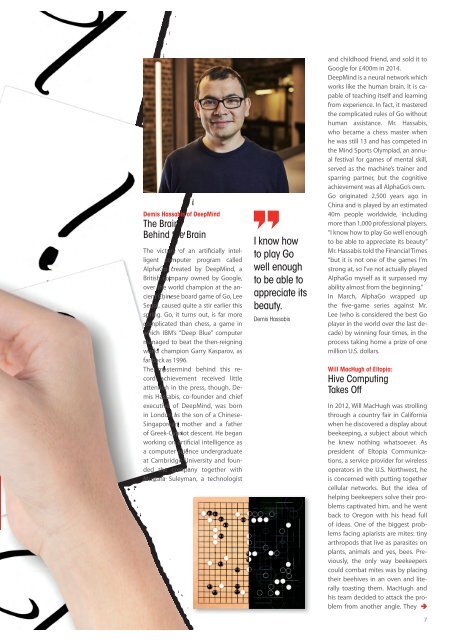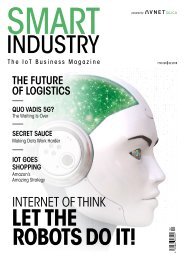Smart Industry 1/2016
Smart Industry 1/2016 - The IoT Business Magazine - powered by Avnet Silica
Smart Industry 1/2016 - The IoT Business Magazine - powered by Avnet Silica
Create successful ePaper yourself
Turn your PDF publications into a flip-book with our unique Google optimized e-Paper software.
Demis Hassabis of DeepMind<br />
The Brain<br />
Behind the Brain<br />
The victory of an artificially intelligent<br />
computer program called<br />
AlphaGo created by DeepMind, a<br />
British company owned by Google,<br />
over the world champion at the ancient<br />
Chinese board game of Go, Lee<br />
Sedol, caused quite a stir earlier this<br />
spring. Go, it turns out, is far more<br />
complicated than chess, a game in<br />
which IBM’s “Deep Blue” computer<br />
managed to beat the then-reigning<br />
world champion Garry Kasparov, as<br />
far back as 1996.<br />
The mastermind behind this record<br />
achievement received little<br />
attention in the press, though. Demis<br />
Hassabis, co-founder and chief<br />
executive of DeepMind, was born<br />
in London as the son of a Chinese-<br />
Singaporean mother and a father<br />
of Greek-Cypriot descent. He began<br />
working on artificial intelligence as<br />
a computer science undergraduate<br />
at Cambridge University and founded<br />
the company together with<br />
Mustafa Suleyman, a technologist<br />
I know how<br />
to play Go<br />
well enough<br />
to be able to<br />
appreciate its<br />
beauty.<br />
Demis Hassabis<br />
and childhood friend, and sold it to<br />
Google for £400m in 2014.<br />
DeepMind is a neural network which<br />
works like the human brain. It is capable<br />
of teaching itself and learning<br />
from experience. In fact, it mastered<br />
the complicated rules of Go without<br />
human assistance. Mr. Hassabis,<br />
who became a chess master when<br />
he was still 13 and has competed in<br />
the Mind Sports Olympiad, an annual<br />
festival for games of mental skill,<br />
served as the machine’s trainer and<br />
sparring partner, but the cognitive<br />
achievement was all AlphaGo’s own.<br />
Go originated 2,500 years ago in<br />
China and is played by an estimated<br />
40m people worldwide, including<br />
more than 1,000 professional players.<br />
“I know how to play Go well enough<br />
to be able to appreciate its beauty”<br />
Mr. Hassabis told the Financial Times<br />
“but it is not one of the games I’m<br />
strong at, so I’ve not actually played<br />
AlphaGo myself as it surpassed my<br />
ability almost from the beginning.”<br />
In March, AlphaGo wrapped up<br />
the five-game series against Mr.<br />
Lee (who is considered the best Go<br />
player in the world over the last decade)<br />
by winning four times, in the<br />
process taking home a prize of one<br />
million U.S. dollars.<br />
Will MacHugh of Eltopia:<br />
Hive Computing<br />
Takes Off<br />
In 2012, Will MacHugh was strolling<br />
through a country fair in California<br />
when he discovered a display about<br />
beekeeping, a subject about which<br />
he knew nothing whatsoever. As<br />
president of Eltopia Communications,<br />
a service provider for wireless<br />
operators in the U.S. Northwest, he<br />
is concerned with putting together<br />
cellular networks. But the idea of<br />
helping beekeepers solve their problems<br />
captivated him, and he went<br />
back to Oregon with his head full<br />
of ideas. One of the biggest problems<br />
facing apiarists are mites: tiny<br />
arthropods that live as parasites on<br />
plants, animals and yes, bees. Previously,<br />
the only way beekeepers<br />
could combat mites was by placing<br />
their beehives in an oven and literally<br />
toasting them. MacHugh and<br />
his team decided to attack the problem<br />
from another angle. They<br />
7

















